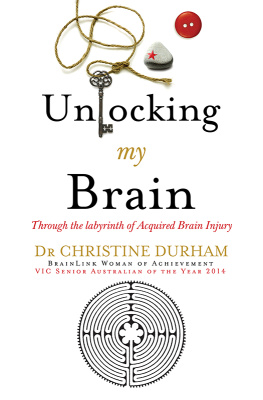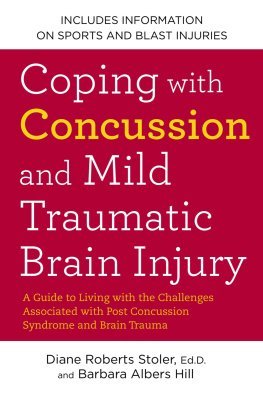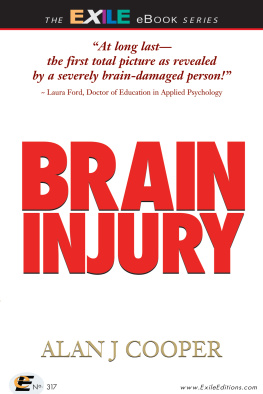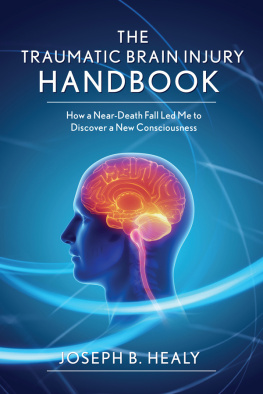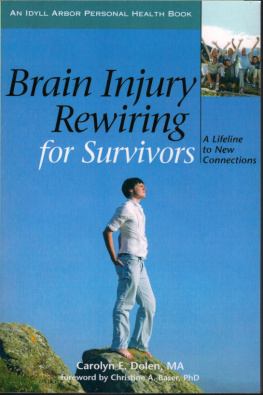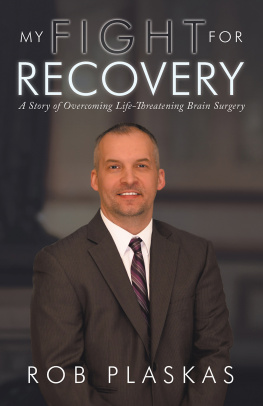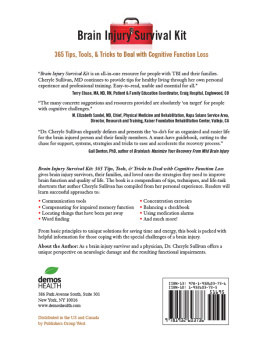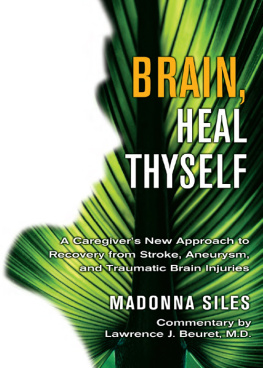Deb Brandon - But My Brain Had Other Ideas: A Memoir of Recovery from Brain Injury
Here you can read online Deb Brandon - But My Brain Had Other Ideas: A Memoir of Recovery from Brain Injury full text of the book (entire story) in english for free. Download pdf and epub, get meaning, cover and reviews about this ebook. year: 2017, publisher: She Writes Press, genre: Non-fiction / History. Description of the work, (preface) as well as reviews are available. Best literature library LitArk.com created for fans of good reading and offers a wide selection of genres:
Romance novel
Science fiction
Adventure
Detective
Science
History
Home and family
Prose
Art
Politics
Computer
Non-fiction
Religion
Business
Children
Humor
Choose a favorite category and find really read worthwhile books. Enjoy immersion in the world of imagination, feel the emotions of the characters or learn something new for yourself, make an fascinating discovery.

- Book:But My Brain Had Other Ideas: A Memoir of Recovery from Brain Injury
- Author:
- Publisher:She Writes Press
- Genre:
- Year:2017
- Rating:5 / 5
- Favourites:Add to favourites
- Your mark:
- 100
- 1
- 2
- 3
- 4
- 5
But My Brain Had Other Ideas: A Memoir of Recovery from Brain Injury: summary, description and annotation
We offer to read an annotation, description, summary or preface (depends on what the author of the book "But My Brain Had Other Ideas: A Memoir of Recovery from Brain Injury" wrote himself). If you haven't found the necessary information about the book — write in the comments, we will try to find it.
Deb Brandon: author's other books
Who wrote But My Brain Had Other Ideas: A Memoir of Recovery from Brain Injury? Find out the surname, the name of the author of the book and a list of all author's works by series.
But My Brain Had Other Ideas: A Memoir of Recovery from Brain Injury — read online for free the complete book (whole text) full work
Below is the text of the book, divided by pages. System saving the place of the last page read, allows you to conveniently read the book "But My Brain Had Other Ideas: A Memoir of Recovery from Brain Injury" online for free, without having to search again every time where you left off. Put a bookmark, and you can go to the page where you finished reading at any time.
Font size:
Interval:
Bookmark:
PRAISE FOR
But My Brain Had Other Ideas
Deb Brandon documents her journey with cerebral cavernous angioma, a disease of brain blood vessels, with ferocious honesty. Her tale offers a glimpse into an often confusing and frightening world in which reality can be upended from one day to the next, a world that requires reaching down to the depths of resilience to stay afloat. Brandons struggles and triumphs will resonate with anyone who suffers from invisible illness and those who love them.
Connie Lee, PsyD, president and CEO, Angioma Alliance
But My Brain Had Other Ideas is wonderfully writtennot only from a literary point of view, but also as a deeply personal and clear explanation of what it feels like to experience the things that Brandon describes.
Dr. William J. Hawthorne III, PsyD, clinical psychology
Deb Brandon is analytical, precise, and detail oriented. But her prose reveals another side of her brain: authentic, poetic, and romantic. I was singularly captured by Brandons storytelling. Beyond my perspective as a surgeon and expert on cavernous angiomas, I could not resist hiking along with her in the wilderness, watching her draw from nature the strength to adjust, and readjust. As a professor, I wanted to be with her as she balanced her challenges with the desire to teach and continue to contribute at the highest level. But My Brain Had Other Ideas is a lively portrait of the personal toll of brain disease.
Issam A. Awad, MD, MSc, FACS, director of neurovascular surgery, University of Chicago Medicine and Biological Services
Told in poetic and exacting language, Deb Brandons intimate account of life with a damaged brain is equal parts hypnotizing, harrowing, and inspiring.
Michael Paul Mason, author of Head Cases: Stories of Brain Injury and Its Aftermath
Disability does not discriminate; it can be joined in the blink of an eye or in this case a rupture in the brain. But My Brain Had Other Ideas is a mind-boggling, roller coaster reality ride of personal trauma, disability, and societys mind-numbing response.
Lawrence Powell, past director of the Office of Disability Resources, Carnegie Mellon University
Deb Brandon is more than a remarkable writer and brain injury survivor: she is a voice that needs to be heard by parents, educators, and physicians. Brandon allows readers to experience her most personal and terrifying moments. Brandons anecdotes, written in fluid prose, emphasize the importance of nonjudgmental support to brain injury victims. I am awed by Brandons pursuit of a new normal. The human spirit is strong in Deb Brandon. Do not miss this inspiring read by an honest and talented survivor.
Kelly B. Darmofal, author of Lost in My Mind: Recovering from Traumatic Brain Injury (TBI) and 101 Tips for Recovering from Traumatic Brain Injury: Practical Advice for TBI Survivors, Caregivers, and Teachers
I know firsthand the challenges you face when you are forsaken by your own body, and Deb Brandons descriptive prose provides an up-close, personal journey through the diagnosis of cavernous angioma, as well as her ultimate victory in reclaiming her life.
Julia Fox Garrison, motivational speaker and author of Dont Leave Me This Way
Deb Brandons memoir, But My Brain Had Other Ideas, is a bravely written personal account about her unimaginable struggles with a little understood brain irregularity. Brandon writes honestly about the details surrounding the alarming symptoms, which eventually turned out to be cavernous angiomas, tiny clusters of malformed blood vessels in her brain. Even more horrifying is the fact that many in the medical community initially dismissed her symptomswhich were due to potentially life-threatening brain hemorrhages. Brandons steadfast determination to not ignore the growing physical complications is what ultimately saved her life.
Su Meck, author of I Forgot to Remember: A Memoir of Amnesia


Copyright 2017 by Deb Brandon
All rights reserved. No part of this publication may be reproduced, distributed, or transmitted in any form or by any means, including photocopying, recording, digital scanning, or other electronic or mechanical methods, without the prior written permission of the publisher, except in the case of brief quotations embodied in critical reviews and certain other noncommercial uses permitted by copyright law. For permission requests, please address She Writes Press.
Published 2017
Printed in the United States of America
Print ISBN: 978-1-63152-246-8
E-ISBN: 978-1-63152-247-5
Library of Congress Control Number: 2017944911
For information, address:
She Writes Press
1563 Solano Ave #546
Berkeley, CA 94707
Cover design Julie Metz, Ltd./metzdesign.com
Book design by Stacey Aaronson/thebookdoctorisin.com
She Writes Press is a division of SparkPoint Studio, LLC.
Names and identifying characteristics have been changed to protect the privacy of certain individuals. The events depicted are true to the best of my memory.
For Daniel and Sarah
2: Id Always Been Healthy. I Still Was.
It Was Just That...
At the turn of the millennium, I was introduced to an illness called cavernous angioma: my infant daughter suffered a major brain hemorrhage leading to her first, horrific and traumatic, emergency brain surgery. Our lives have never been the same.
Cavernous angioma isnt an illness that develops gradually, like heart disease or arthritis or diabetes. As with my daughter, its an in-your-face eventa brain hemorrhage or seizurethat leads to the diagnosis. Once the diagnosis occurs, there is never a safe time, a relaxed time. Sometimes we forget, but a headache, a flu, an odd twitch can bring back the entire history of illness and hospitalizations. The risk of hemorrhage is always there, with no way to predict when it will happen.
Cavernous angiomas are defects existing in the smallest blood vessels in the brain and spinal cord. These lesions are missing essential supporting layers and develop into leaky, mulberry-shaped clusters. They start as pinpoints, invisible to all but the most sensitive imaging, but over time, they grow. If the growth happens slowly, as is typical, its possible for them to remain silent. Its not unusual to be newly diagnosed with multiple lesions the size of grapes scattered throughout ones brain that have been growing for years.
But then there are hemorrhages, the events a person with a cavernous angioma fears most. Over a span of hours or, at most, a few days, a hemorrhage can cause a pinpoint lesion to balloon, often to the size of a golf ball. Symptoms may start slowly but can become incapacitatinglost sight, paralysis, seizureor fatal. Its a medical crisis.
A hemorrhage marks a decision point: brain surgery or leave it alone? Lesions that hemorrhagebleedhave a very high likelihood of hemorrhaging again and again. The only treatment we have at the time of this writing is invasive brain surgery. For some people, surgery is an option; for others, because of the delicate location of the lesion and possible consequences, its not. Its hard to fathom, but in the Angioma Alliance community, those who are allowed to have brain surgery are considered lucky.
By my daughters sixteenth birthday, she was a high school sophomore and had had four brain surgeries. A naive life of reckless abandon is not possible for a person with cavernous angiomas, even for a teenager. The first hemorrhage steals invulnerability and instills caution. We escape in our own ways, because existing naked, steeped in the reality of her sixty brain lesions, would be paralyzing. We live each moment we can in the precious but poignant present.
Next pageFont size:
Interval:
Bookmark:
Similar books «But My Brain Had Other Ideas: A Memoir of Recovery from Brain Injury»
Look at similar books to But My Brain Had Other Ideas: A Memoir of Recovery from Brain Injury. We have selected literature similar in name and meaning in the hope of providing readers with more options to find new, interesting, not yet read works.
Discussion, reviews of the book But My Brain Had Other Ideas: A Memoir of Recovery from Brain Injury and just readers' own opinions. Leave your comments, write what you think about the work, its meaning or the main characters. Specify what exactly you liked and what you didn't like, and why you think so.

